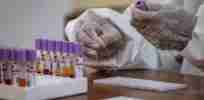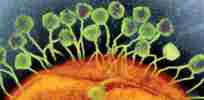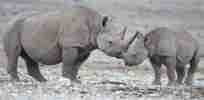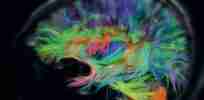Ed Yong
Articles written for the GLP list the source as Genes and Science. All other articles were written for the sources noted with excerpts provided by the GLP.

Viewpoint: How COVID-19 has brought America to its knees
Despite ample warning, the U.S. squandered every possible opportunity to control the coronavirus. And despite its considerable advantages—immense resources, biomedical ...

‘This virus has ruined my life’: Some COVID-19 patients have suffered through symptoms for months—with no end in sight
About 80 percent of [COVID-19] infections, according to the World Health Organization, “are mild or asymptomatic,” and patients recover after ...

Unanswered COVID-19 questions multiply: Why some people get really sick and others not? Does social distancing really matter? Are models right?
In a pandemic characterized by extreme uncertainty, one of the few things experts know for sure is the identity of ...

Are we facing a ‘more transmissible’ coronavirus strain? Not so fast, researchers say
As if the pandemic weren’t bad enough, on April 30, a team led by scientists at Los Alamos National Laboratory ...

There are 7 coronaviruses that infect humans. Here’s what makes SARS-CoV-2 so dangerous
SARS-CoV-2 is not the flu. It causes a disease with different symptoms, spreads and kills more readily, and belongs to a completely ...

There are 3 possible endgames for the coronavirus pandemic
Three months ago, no one knew that SARS-CoV-2 existed. Now the virus has spread to almost every country... . It ...

Here’s a virus that CRISPR can’t touch—it could help researchers gain better control of the gene-editing tool
Bacteria and phages are likely locked in an arms race. The former evolve new kinds of scissor enzymes, and the ...
‘Utterly magical’: This ‘two-step dance’ may explain the origins of life
Go back far enough in time, before animals and plants and even bacteria existed, and you’d find that the precursor ...
10 years ago, the Human Brain Project promised to simulate a human brain. What went wrong?
On July 22, 2009, the neuroscientist Henry Markram walked onstage at the TEDGlobal conference in Oxford, England, and told the ...
Only half of psychology studies can be replicated. That’s a big problem
Over the past few years, an international team of almost 200 psychologists has been trying to repeat a set of ...
‘Anti-evolution drug’ could stop superbugs from mutating
Over the past 90 years, scientists have discovered hundreds of antibiotics—microbe-killing drugs that have brought many pernicious diseases to heel ...
‘Blinding speed’: How an ice age led to the populating of the Americas
Tens of thousands of years ago, two gigantic ice sheets smothered the northernmost parts of what has since been named ...

No, humans haven’t wiped out 60 percent of animals since 1970. But things still look ugly
Since [October 29], news networks and social media have been abuzz with the claim that, as The Guardian among others ...
Chasing the virus behind surging polio-like illness
[Fall 2014] Kevin Messacar, a pediatrician at Children’s Hospital Colorado, started seeing a wave of children with inexplicable paralysis. All of ...
Ancient genetic oddity makes whales and other aquatic mammals deadly susceptible to common pesticides
Over the past 50 million years, a group of small, hoofed mammals gradually evolved into today’s whales and dolphins. In ...
How bacterial CRISPR defense systems are defeated by suicidal virus attacks
The natural world abounds with examples of predators that cooperate to take down their prey. And such teamwork also exists ...
How did our brains get so big?
By studying [brain organoids, researcher Frank] Jacobs could look for genes that are switched on more strongly in the growing ...
Sleeping helps us find ‘out of the box’ solutions to difficult problems
[M]any experiments have shown that sleep promotes creative problem-solving. Now, Penny Lewis from Cardiff University and two of her colleagues have collated and ...
Is it time to discuss what we should or shouldn’t do with ‘lab-grown blobs of human brain tissue’?
Rusty Gage and colleagues at the Salk Institute [recently] announced that they had successfully transplanted lab-grown blobs of human brain tissue ...

Delving into the minds of psychopaths
It’s a rare person who goes out of their way to spend time with psychopaths, and a rarer one still ...
Personalized piglets could offer insights into disease progression in children
To better understand [incurable inherited disease neurofibromatosis type 1, Charles] Konsitzke learned, you need a species that’s closer in both ...
How evolution contributed to the demise of the passenger pigeon
Passenger pigeons were once the most abundant bird in North America, and quite possibly the world. … In a matter ...
Oldest known human fossils rewrite Homo sapiens history
Hundreds of thousands of years ago, around 62 miles west of what would eventually become Marrakesh, a group of people ...

Brain studies weakened by lack of diversity in participants
[S]ocial sciences [tend] to focus on people from WEIRD societies—that is, Western, educated, industrialized, rich, and democratic. The results of such studies ...
One-fourth of cow genome descendant from snakes and lizards, study shows
There are genes known as retrotransposons that can copy themselves and paste the duplicates in other parts of our DNA, ...
CRISPR co-inventor Jennifer Doudna embraces ethical debate over gene editing
As few as five years ago, [biochemist Jennifer Doudna] was, by her own admission, working head-down in an ivory tower, with ...

Diseases and behaviors likely the product of thousands of genes with complex interactions
If you told a modern geneticist that a complex trait...was the work of just 15 genes, they’d probably laugh. It’s ...
Discovery of 315,000-year old human fossils may rewrite history of our ancestors
[B]ones of the former occupants [of a Moroccan cave called Jebel Irhoud] have been recently unearthed by an international team ...

